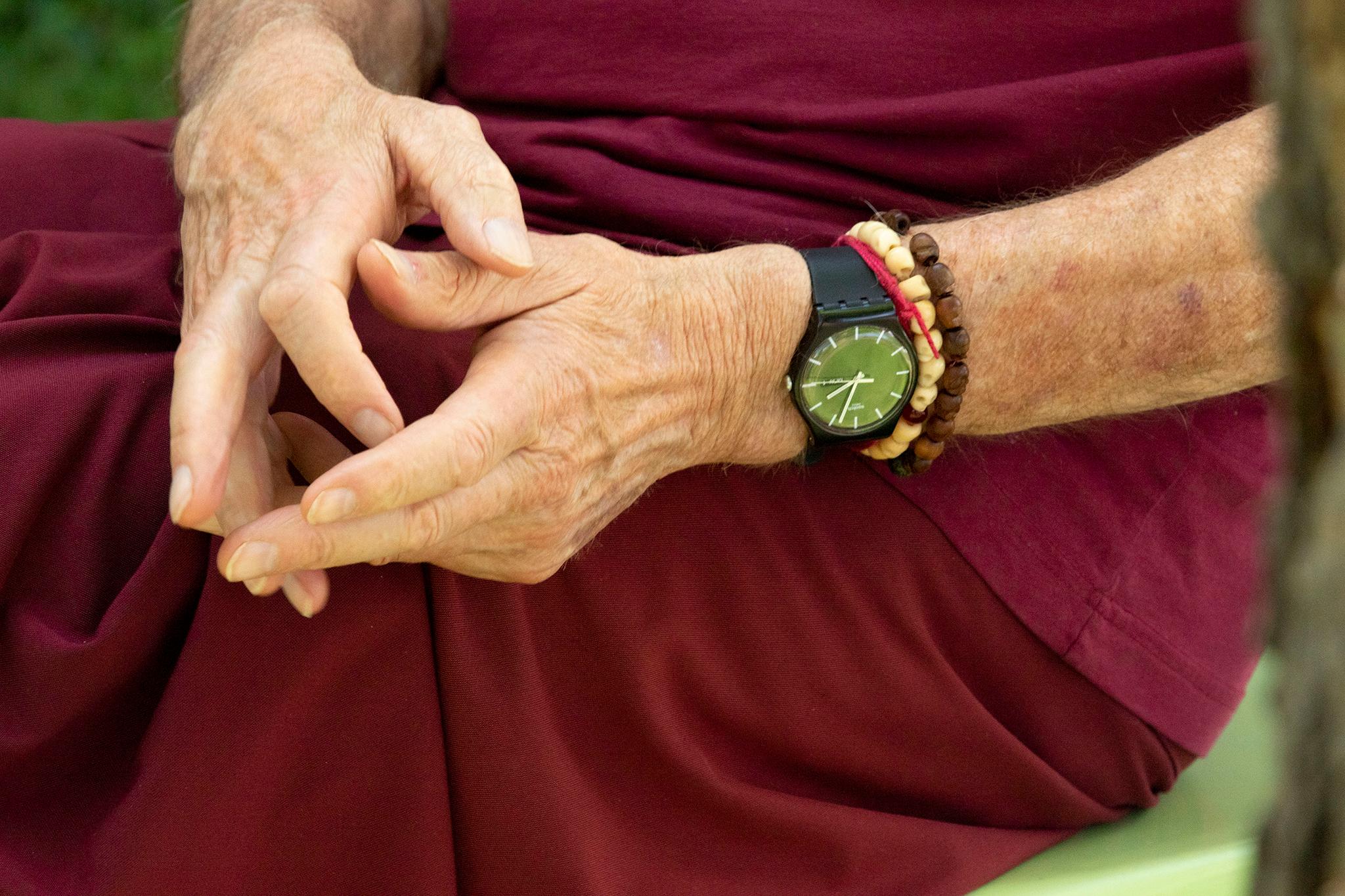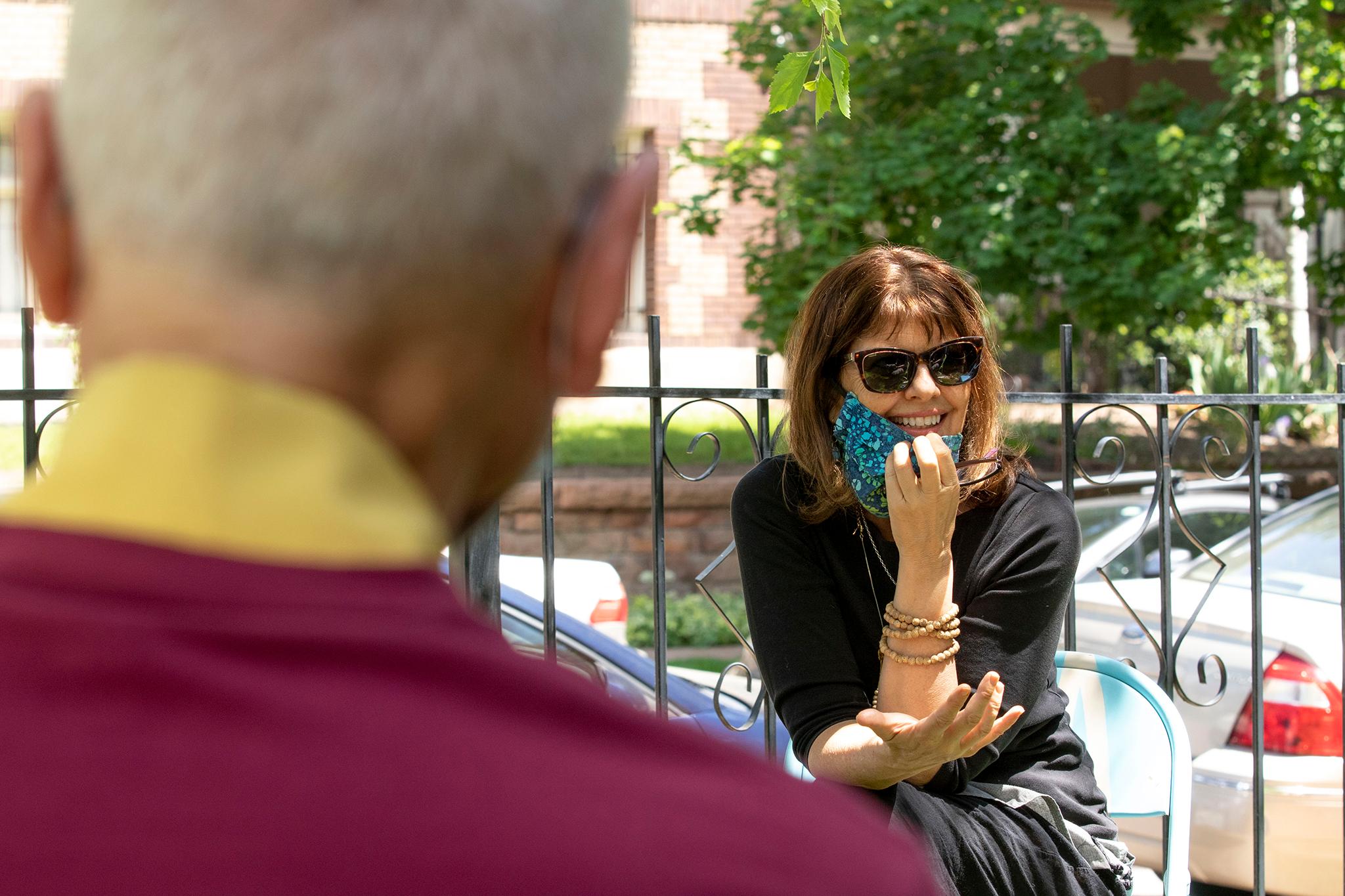When I heard about a bunch of Buddhists quarantining together in a house near Cheesman Park, I was prepared to feel inadequate upon meeting them.
Surely they had figured out this interpersonal-relationships-under-glass thing and would be irritatingly calm as they described the smooth running of their household during the pandemic.
It turns out, though, that they're just like the rest of us. The artist, the grandfather, the former telephone lineman and other residents of the house owned by Kadampa Meditation Center Colorado get upset when the dishes don't get done or the Internet drops. They label their stuff in the fridge. Sometimes they need a break from one another.
What they do have to help them get through the day is a shared and deeply held belief in meditation and in the power of kindness. Not all the rest of us can say that.
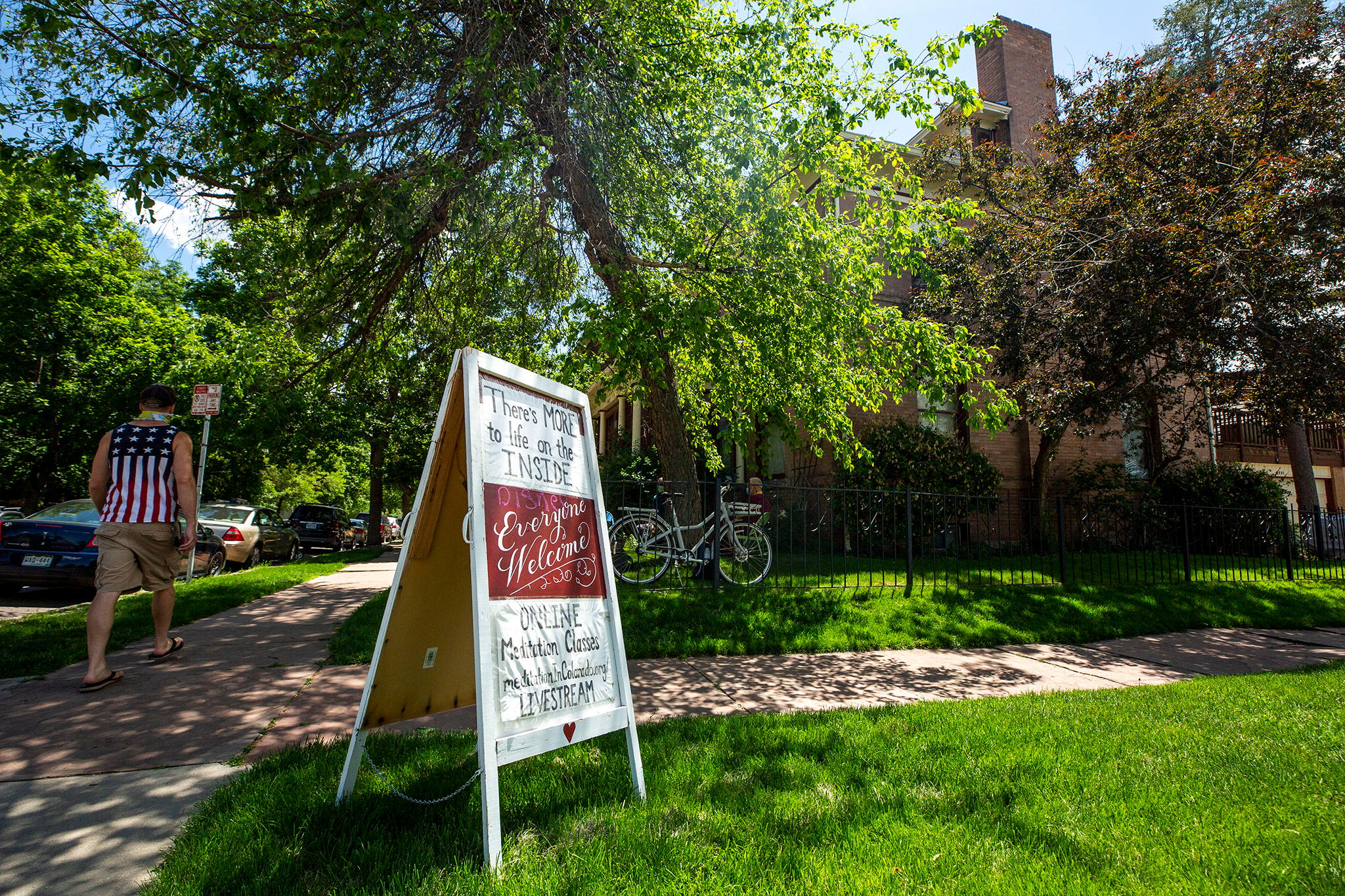
Since the coronavirus hit Denver, in-person meditation classes have been canceled at the house, at 1081 North Marion Street, and at the main Kadampa teaching center downtown, at 1336 Glenarm Place. On Marion Street, the eight housemates, who include the center's main teacher Lucy James, stocked up on cleaning supplies and masks and closed the doors to outsiders for the stay-at-home orders. They have continued to be careful as Denver has transitioned to safer-at-home, in part because some of their members are older and have health problems that could put them at risk for the most serious consequences of COVID-19.
The Denver Art Museum has brought James in to teach mindfulness in the galleries. The Denver center is two decades old and part of the global New Kadampa Tradition Buddhist sect founded in England in 1991 by Kelsang Gyatso Rinpoche, whose name is usually preceded by the religious title "geshe." The movement has been at the center of controversies, including the turmoil that began in the late 1990s when the Dalai Lama banned prayers to Dorje Shugden, a Buddhist deity. Kelsang -- Tibetans traditionally put their family name first -- opposed the Dalai Lama's stance on Dorje Shugden.
New Kadampa Tradition has been criticized as Westernized and simplified Buddhism. Alexandra Bonano, Kadampa Meditation Center Colorado's administrative director, portrays it differently. She said Kelsang's teachings have helped her address modern concerns.
New York-born and -raised Bonano was 10 years old when her brother's wife introduced her to Buddhism. In her 20s, Bonano set out to find a formal teacher.
At the time she was researching her anthropology doctoral thesis on race and gender issues around beauty practices in Dominican communities in New York, Madrid and the Dominican Republic. She used her research skills to make a list of Buddhist centers in her hometown to check out. She was struck by the Kadampa classes she found on topics such as managing anger and defining compassion.
"It was just really clear. That's why I stuck around," she said. "It can't be philosophy only. It has to be practical."
She was teaching classes of her own, to college students in the history of racism and its enduring impact on society. Until she found Kadampa, she said, she felt she was teaching students about problems without being able to offer solutions.
"I wanted to provide something to the community that was a tool to deal with all the craziness," she said.
Bonano said a misconception about Buddhists is "that we're supposed to live in a cave and retreat from the world."
Meditation, she said, enables people to make wise choices and strengthens their compassion. She said getting in the right mindset is important before taking steps to address problems, whether it's racism or getting along with housemates.
"You can have the best intentions in the world to help. But if you're consumed with rage, how can you help?" Bonano said. "There's a lot of power with having a peaceful mind. And confidence. And fearlessness."
Bonano abandoned her thesis to teach meditation in Washington Heights, where she had grown up, and elsewhere in New York. New Kadampa Tradition later sent her to open a branch in New Orleans. She arrived in Denver last summer.
Bonano came from New Orleans with a boyfriend, a dog and no intention of staying at the Marion Street house for longer than a few months while she settled into her new job. She'd grown up with four siblings and treasured "having my personal space" as an adult.
Some aspects of life at the Marion Street house -- bathrooms and chores are shared and refrigerator sections are labeled with residents' names so it's clear whose food belongs to whom -- reminded Bonano of her college days.
But she found the light-brick house beautiful -- and affordable. Residents pay rents that vary, none more than $500, Bonano said.
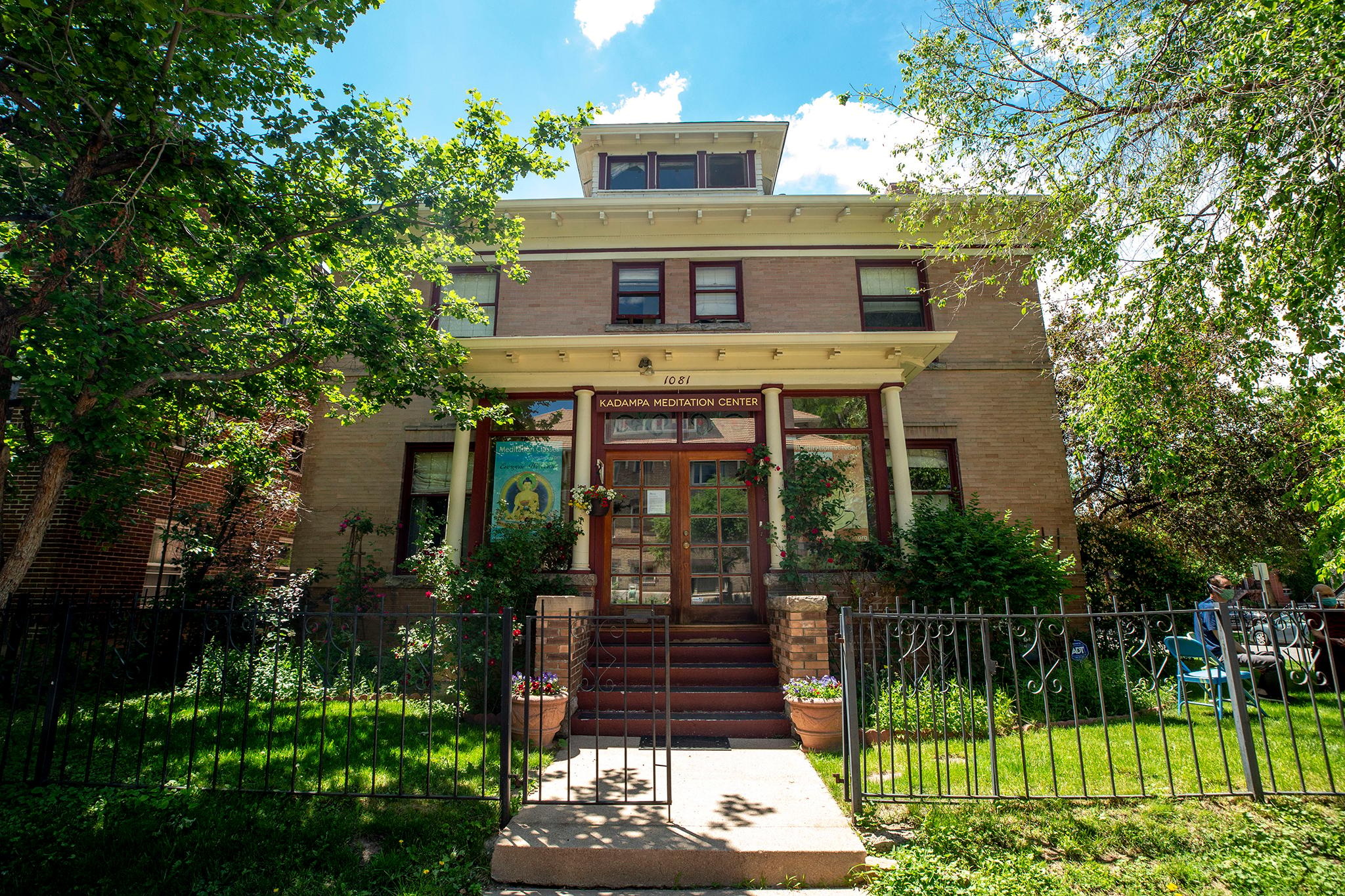
"We don't charge more than we pay for the mortgage," she said. "Actually, I think we charge less."
She saw other advantages.
"You're just always around people who are trying to do their best," she said. "You just always felt there was someone there you could ask for help."
Bonano, her boyfriend, and Sam, their elderly rescue miniature Schnauzer, moved to their own place in Golden shortly before the coronavirus restrictions were imposed. Bonano said that when the pandemic struck, she considered moving back into Marion Street.
"I thought that my presence was automatically going to make people feel better," she said. "Then I realized they are adults and they are (meditation) practitioners."
The last in-person classes were held March 15. Two days later, online sessions began. Marion Street residents and Bonano have been spending a lot of time on their screens. In the first few weeks, Bonano held regular Zoom meetings with people in the house. Now they just keep a group chat going on their mobile phones. Bonano recently asked whether anyone wanted a Zoom meeting.
"Only one person responded," she said in a Zoom interview, and laughed.
Bonano's and her boyfriend's departure to Golden left the house with one couple. Nick Birdsall, whom Bonano succeeded as administrator after he stepped down for health reasons, shares a room in the house with his wife.
"And it's small," Birdsall said.
He and his wife swap dish-washing duties. Birdsall said frictions don't get much bigger than sometimes losing track of whose turn it is.
"It might be yours, but I'll do it," Birdsall said he thinks in those situations. "It's more important to be kind than to be right."
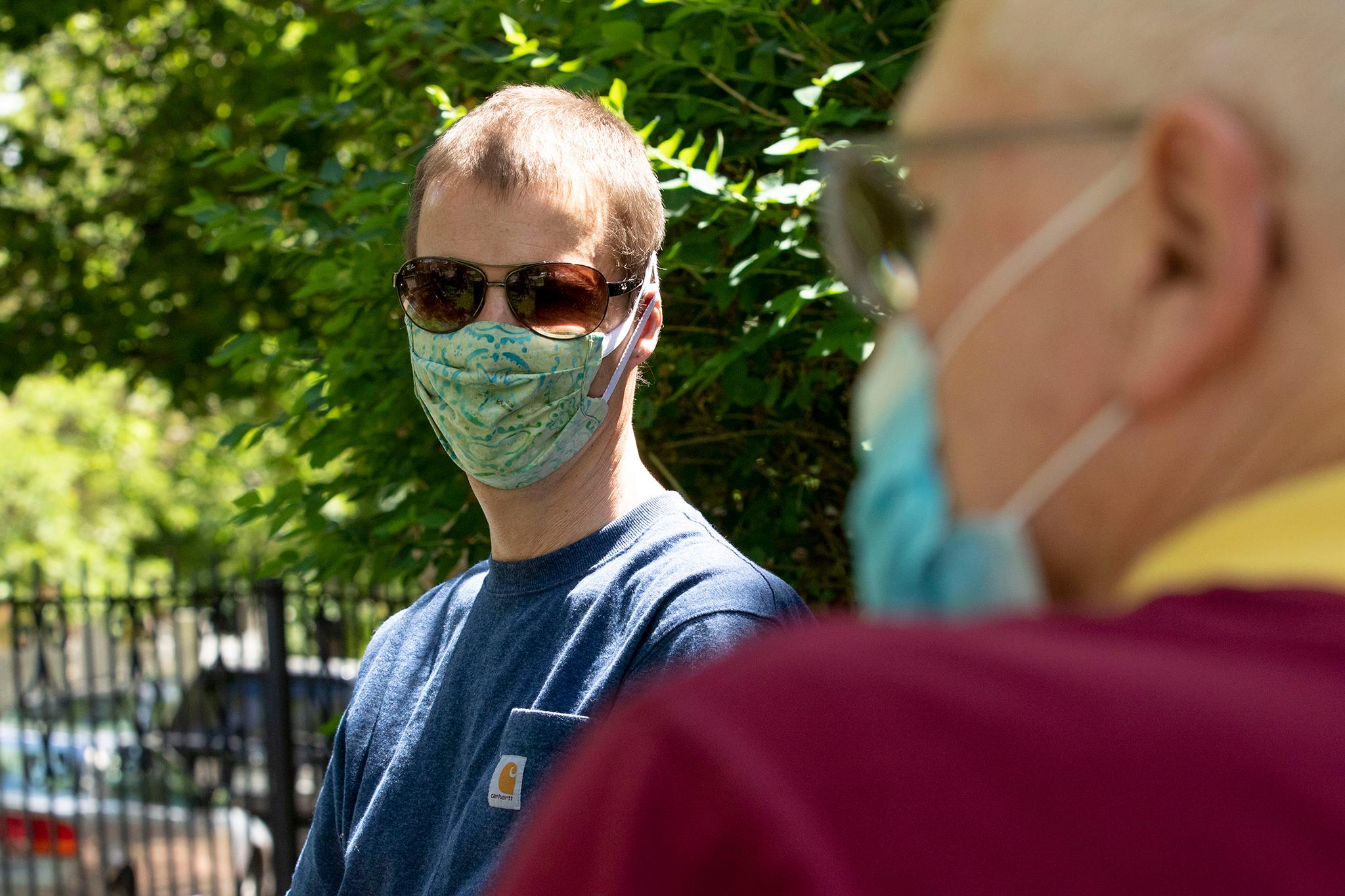
James, the senior teacher in the house, said most residents have had similar training in interpersonal relationships. She adds that getting along might be easier for the Marion Street group than in a family home where parents might be both working and teaching and entertaining kids, or navigating strains with their own parents. James is not sure she'd do as well at home with her mother in England as she is here in Denver.
"I sort of count myself lucky that I've been in this house with these people," said James, who has lived at Marion Street for seven years. "If I were a perfect saint, I wouldn't say that."
Since the coronavirus shutdown began, James has been rising in her apartment on the top floor of the house every morning and commuting downstairs to the meditation room to live-stream classes. Her housemates join her -- at a social distance -- in the meditation room so she doesn't have to engage with just the camera. Bonano's boyfriend Josh Ruzansky had the technical expertise to help get Denver and other New Kadampa Tradition centers on line.
James once spent three years in a spiritual retreat, seeing hardly anyone. More recently, she's gotten used to traveling frequently to give talks, meeting new people. She'd just returned from six weeks in New York when the coronavirus hit Denver.
"How are you with the same people day in and day out and not find them boring?" she said. "To me, it's love. You love them: You find them interesting."
Or it could be that Marion Street has drawn an interesting mix of people.
Kelsang Pagma, the center's education program director, has lived at Marion Street for 12 years. Pagma, who took the New Kadampa Tradition founder's family name as her own when she became a nun, helped get the online classes running. She helps James keep track of questions relayed in the chat room and sends reassuring texts to viewers when screens freeze. She said Bonano, the administrative director, coined the mantra: "Refresh your mind and refresh your screen."
"We just laugh about it and have fun," Pagma said.
Pagma had taken meditation classes as a student at Metropolitan State University of Denver, where she studied art. A Kadampa Meditation Center Colorado flyer -- like the ones she now designs -- led her to Marion Street.
"As soon as I went to my first class, I just felt like that was it, that was what I wanted," she said.
Pagma recently left Marion Street to stay with her mother and stepfather near Aspen Park, where she grew up. She wanted to help her mother and to give her housemates a bit more space. She monitors classes from afar using her computer.
"My mom and her husband have a different kind of spirituality. But we can connect," Pagma said.
She said temporarily leaving Marion Street has offered lessons. Without the regular trips to the 1336 Glenarm Place classrooms that had been part of her pre-pandemic routine, Pagma said she found herself getting anxious around her housemates. It felt like a fight-or-flight reaction she traced to trauma lingering from a head injury she'd suffered in a traffic accident when she was in junior high school.
Pagma said that before the pandemic, she would too often immerse herself in work and not devote enough time to meditation. She's been meditating more at her mother's house, and plans to continue to do so when she returns to Marion Street.
"Meditation's definitely the path that's helped me heal the most," she said.
Pagma said she would return to Denver when in-person classes resume in some manner. She does not expect that to happen before autumn.
"We're not rushing things," Bonano said. "It's just not safe."
Meditation teacher and three-year Marion Street resident Doug Yarn said he hopes for a continuation of at least some of the online classes, which have allowed Kadampa to reach a far-flung audience.
"Anyone can move into this virtual community with the technology, what we have right now," Yarn said. "I don't know about going back to the brick and mortar and waiting for people to come by the building."
Yard had a varied career before becoming a meditation teacher. He's been a lineman in Louisiana, a phone service technician in Georgia, a driving instructor in Maryland -- to name a few. A job in computer programming brought him to Denver in 2013.
"Here I am in my late 60s, and I think I know something," Yarn said. "I might have learned one or two things. I had all those different jobs, different titles, different skills. And yet the art of meditation has helped my knowledge grow exponentially."
Yarn, raised in a Presbyterian family in South Carolina, said that since he was a child he has been curious about spirituality. As an adult, he was drawn to the teachings of Thich Nhat Hanh, a Vietnamese-born Zen Buddhist monk. Hanh is credited with influencing Dr. Martin Luther King Jr. to speak out against the Vietnam War. King nominated Hanh for the 1967 Nobel Peace Prize.
Yarn still keeps up with news from Plum Village, the center Hanh founded in southwest France. A few years after he moved to Denver, a friend who knew of his interest in meditation told Yarn about Kadampa when he was looking for a new place to live. He'd never before considered living with others who meditated. But he visited Marion Street and "it seemed to me just right. The perfect thing."
"Meditation is about bringing peace to the mind," he said. "Being peaceful is being kind. It has something to do with compassion. It has to do with virtuous acts, meaningful acts.
"One of the major things that has helped me understand is by being around people who understand it better than I do."
At Marion Street, residents do their own shopping and cooking, though they might sit down at the same table for meals. Yarn has a car and runs his own errands, though he has most of his shopping delivered.
"I feel independent of the others," Yarn said. "Even though we are interdependent."
Kelsang Labsum, a monk, had been living in a Buddhist center in San Francisco when his son in Denver asked him to move closer. Labsum, who joked that his day job was helping look after his 5-year-old granddaughter and 7-year-old grandson, said knowing he would be able to live at Marion Street made his move in 2017 easier. He also teaches at the center.
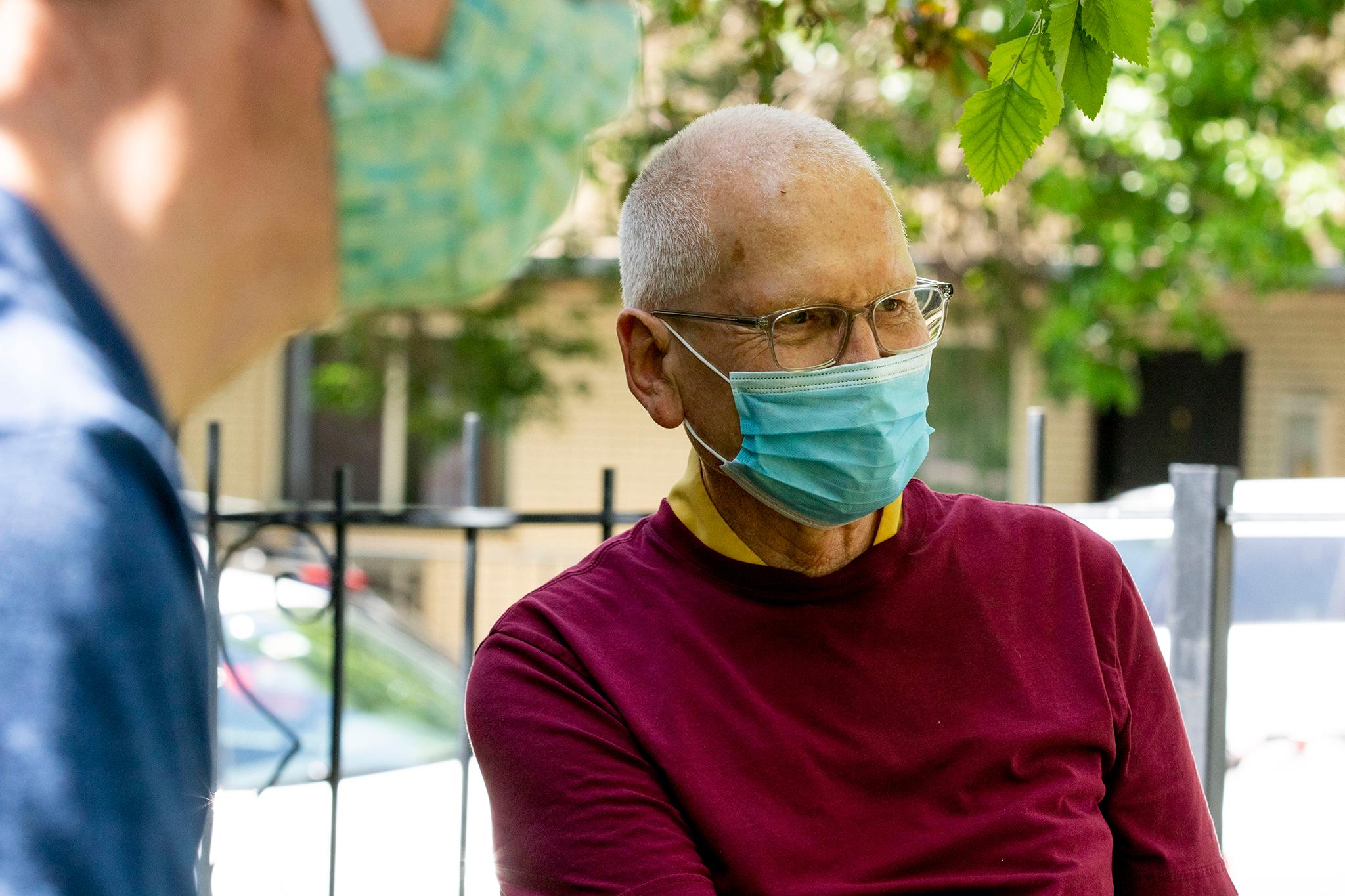
For now, Labsum is keeping his grandchildren at a distance because of the coronavirus.
"They come like this," he said, gesturing with his arms wide. "Air hugs."
Real hugs are a pre-pandemic memory. Labsum always cooked his own meals and didn't go to the movies, so in some ways his life has not changed much.
"You know what I really miss?" he said. "It's the Botanic Gardens. I cannot get into the back door."
While members still can't use their fobs at the Cheesman gate, they can book visits online as part of a gradual reopening of the gardens to limited numbers of guests. Labsum, sounding more amused at himself than irritated, said he hasn't yet gotten used to making reservations.
